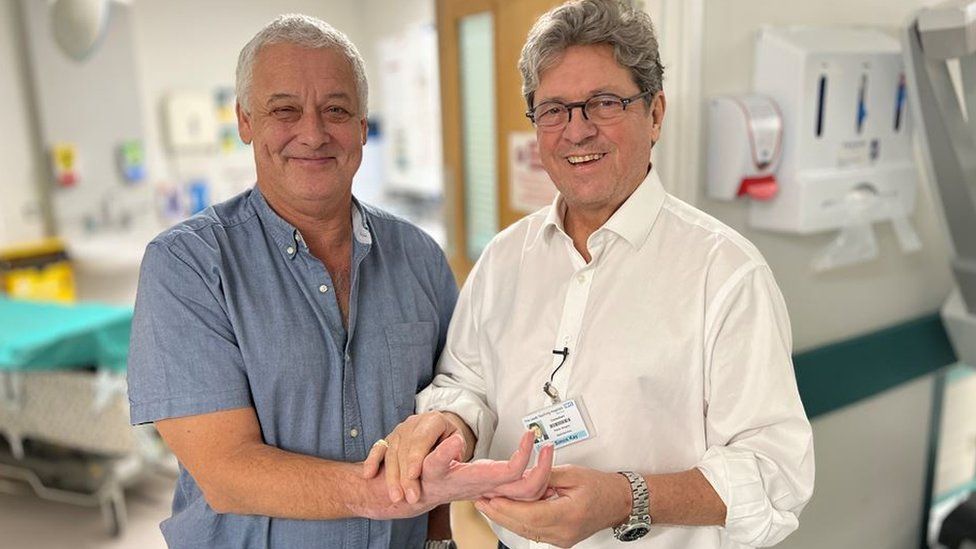
Patient Mark Cahill and Prof Simon Kay
On 27 December 2012, the UK’s first hand transplant took place at Leeds Teaching Hospitals NHS Trust (LTHT). A decade on, we spoke to the patient and his pioneering surgeon.
“Many patients say after surgery it is the small things that are the most significant to them,” says Prof Simon Kay OBE, a consultant plastic surgeon.
“Being able to brush their daughter’s hair, take money out of a purse or turn on the tap and fill a glass of water, and to feel complete again.”
Or, in the case of former West Yorkshire pub landlord Mark Cahill, save his wife’s life after she suffered a heart attack.
Leeds, the home of the UK Hand Transplant Unit, is the UK’s only provider of this type of complex surgery. It is also now considered one of the leading hand transplant services in the world. It’s an area of medicine that would have seemed implausible just a few decades ago.
Mr Cahill is the poster boy for this unit. In 2012, his right hand had become so badly infected following years of gout that it required amputating.
He addresses Prof Kay as “Prof”, revealing a familiarity forged through years of interaction. When the consultant takes hold of his patient’s hand and inspects his work, the connection and pride is clear for all to see.
Some patients who have walked these corridors over the past decade lost their hands or limbs due to accidents. Others lost theirs to medical conditions such as sepsis or scleroderma.
“My mother had seen Professor Kay on the television saying he was going to do hand transplants,” recalls Mr Cahill, of Greetland near Halifax. “I managed to get to see him, and he said I was an ideal candidate. I talked it over with my family and thought I may as well go for it, it’s got to be better than what I’ve got, which it turns out it has been.”
Leeds is the home of the UK Hand Transplant Unit
Key facts about hand transplant
- Very few donors or their families agree to donate their hands
- Hand donation is not an option that can be selected from the donor register
- Finding a match is more complex than for other organs as physical look and psychological acceptance play a key role in transplant success
- A one-year assessment of the patient is key and includes psychological as well as immunological assessment
- Recovery and full usage of the new transplants can take between one and three years
- Hand transplant is not yet available for children, but this is an area the team aims to develop
Source: Leeds Teaching Hospitals NHS Trust
Only after intense psychological interviews, did he go under the surgeon’s knife. “They test your psychological being to see if you’re suitable,” he says.
On Boxing Day, the call he and his family had been waiting for finally came. “They said, ‘can you come across?’ They said you might spend a while in hospital while we do the tests to see if you’re suitable. All sorts run through your mind – will it be successful, will I like it? You don’t know these things until after the operation.”
To him, the decision to have the transplant was a no-brainer. The surgical team liaised with surgeons in France who performed the first hand transplant in 1998.
“They put me to sleep and I woke up with a new hand,” says Mr Cahill, who underwent the transplant the following day. “I remember waking up in the high dependency unit afterwards and Prof came in and said, ‘let’s have a look’.
“I could move my fingers just a slight bit and Prof said, ‘don’t do that just yet’. So I thought, it’s working already. It’s incredible that it moved so quickly.”
Mark Cahill says he can now perform basic tasks with his new hand.
Months of physiotherapy followed. “It was difficult at the start,” he recalls. “Your nerves take a long time to grow back and without them your movement and feeling is not altogether there.”
The operation has changed his life, giving him back his independence. He says: “I used to have to ask people to do things for me. Driving, for instance, I can steer with my right hand that makes it so much easier.”
It also proved life-saving when, in 2016, Mr Cahill’s wife Sylvia suffered a heart attack. “She died for 19 minutes and for at least 10 of them I kept her alive with heart compressions using my right hand,” he says.
He says he will forever be grateful to the team.
“They have been absolutely fantastic,” says Mr Cahill. “Life is fine now. It’s great.”
Exceptional expertise
Prof Kay also looks back with pride.
“In 10 years, we have moved from performing what was seen as a pioneering surgery, to establishing this service as accessible, well-coordinated and one of the top two units in the world,” he says.
Image source, Leeds Teaching Hospitals NHS Trust
Prof Kay and a specialist team performs the UK’s first double hand transplant operation in July 2016
“The level of expertise and quality of care in this team is exceptional and of course our surgeries would not be possible without the courage and generosity of the donors and their families.
Their contribution has enabled us to change lives and to work in this field is a privilege.”
But, 10 years on from that first operation, hand donation is still not an option that can be selected on the donor register.
“We need donors,” says Mr Cahill. “It’s a very difficult question for nurses to ask people (next of kin).”
Follow BBC Yorkshire on Facebook, Twitter and Instagram. Send your story ideas to yorkslincs.news@bbc.co.uk.
Related Internet Links
The BBC is not responsible for the content of external sites.
